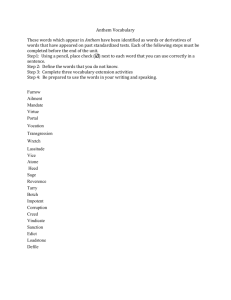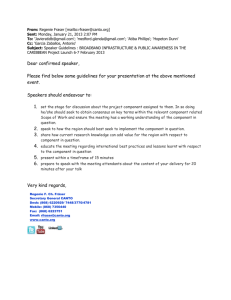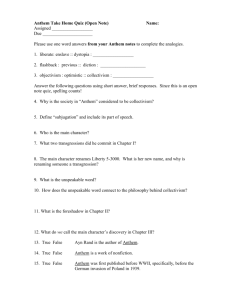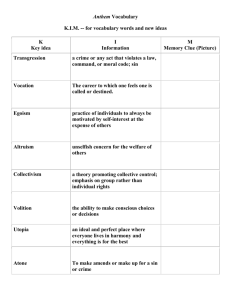Italian Anthem, Paolo Conte, RMS Republic, Wikipedia Languages
advertisement
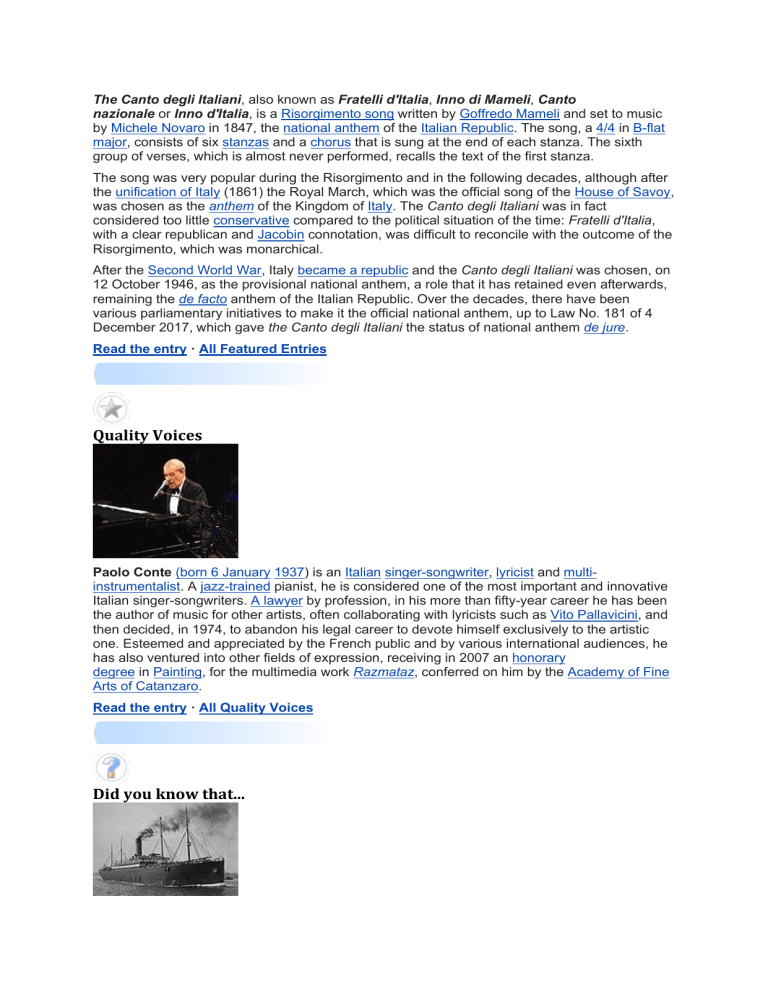
The Canto degli Italiani, also known as Fratelli d'Italia, Inno di Mameli, Canto nazionale or Inno d'Italia, is a Risorgimento song written by Goffredo Mameli and set to music by Michele Novaro in 1847, the national anthem of the Italian Republic. The song, a 4/4 in B-flat major, consists of six stanzas and a chorus that is sung at the end of each stanza. The sixth group of verses, which is almost never performed, recalls the text of the first stanza. The song was very popular during the Risorgimento and in the following decades, although after the unification of Italy (1861) the Royal March, which was the official song of the House of Savoy, was chosen as the anthem of the Kingdom of Italy. The Canto degli Italiani was in fact considered too little conservative compared to the political situation of the time: Fratelli d'Italia, with a clear republican and Jacobin connotation, was difficult to reconcile with the outcome of the Risorgimento, which was monarchical. After the Second World War, Italy became a republic and the Canto degli Italiani was chosen, on 12 October 1946, as the provisional national anthem, a role that it has retained even afterwards, remaining the de facto anthem of the Italian Republic. Over the decades, there have been various parliamentary initiatives to make it the official national anthem, up to Law No. 181 of 4 December 2017, which gave the Canto degli Italiani the status of national anthem de jure. Read the entry · All Featured Entries Quality Voices Paolo Conte (born 6 January 1937) is an Italian singer-songwriter, lyricist and multiinstrumentalist. A jazz-trained pianist, he is considered one of the most important and innovative Italian singer-songwriters. A lawyer by profession, in his more than fifty-year career he has been the author of music for other artists, often collaborating with lyricists such as Vito Pallavicini, and then decided, in 1974, to abandon his legal career to devote himself exclusively to the artistic one. Esteemed and appreciated by the French public and by various international audiences, he has also ventured into other fields of expression, receiving in 2007 an honorary degree in Painting, for the multimedia work Razmataz, conferred on him by the Academy of Fine Arts of Catanzaro. Read the entry · All Quality Voices Did you know that... The RMS Republic (formerly SS Columbus) was a British ocean liner operating for the White Star Line between 1903 and 1909. Recognized as one of the largest and most opulent ships of the Edwardian age, it was nicknamed "the millionaires' ship." She was wrecked on January 24, 1909, following a collision with the ship Florida, off the island of Nantucket, on which occasion she managed to stay afloat long enough to allow the evacuation of most of the passengers; its sinking has gone down in history for being the first where the CQD emergency signal (predecessor of the SOS) was used. The Republic is therefore the first ship in history to have called for help by radio. Paradoxically, the relative success of the Republic's evacuation doomed one of its immediate successors, the Titanic, creating a false sense of security and a general relaxation of the common sense of danger and maritime accident prevention measures. Read the entry · Propose another entry Anniversaries of April 27 Ferdinand Magellan Born... • • • Samuel Morse (1791)) Herbert Spencer (1820)) Ulysses S. Grant (1822)) ... and deaths • • • Ferdinand Magellan (1521) Antonio Gramsci (1937)) Olivier Messiaen (1992)) On this day it happened... • • • • 1667 – John Milton, now blind and reduced to poverty, sells the rights to his epic poem Paradise Lost for ten pounds. 1941 – Le truppe tedesche entrano ad Atene. 1981 – La Xerox Palo Alto Research Center presenta il mouse, la periferica del computer che aprirà le porte dell'interfaccia grafica. 1997 – Papa Giovanni Paolo II chiede pubblicamente perdono per le colpe dei figli della Chiesa durante le guerre di religione, crociate in primis. Ricorre oggi: in Sudafrica si celebra la Festa della libertà. La Chiesa cattolica celebra la memoria dei santi Liberale, Antimo di Nicomedia e Zita di Lucca. Nelle altre lingue Di seguito sono elencate le 10 versioni maggiori di Wikipedia (per numero di voci, non necessariamente per qualità o dimensioni totali) e una selezione casuale di altre edizioni con un numero minore di voci: Le 10 maggiori (al 27 aprile 2024): English (inglese) (6 817 276) · Binisaya (cebuano) (6 118 853) · Deutsch (tedesco) (2 904 514) · Français (francese) (2 607 882) · Svenska (svedese) (2 583 458) · Nederlands (olandese) (2 157 033) · Русский (russo) (1 976 327) · Español (spagnolo) (1 948 839) · Italiano (1 861 062) · ( مصرىMaṣrī, arabo d'Egitto) (1 623 066) Dal mondo di Wikipedia: ( עבריתebraico) · Lietuvių (lituano) · Norsk nynorsk (norvegese nynorsk) · Íslenska (islandese) · Basa Jawa (giavanese) · Asturianu (asturiano) · Winaray (waray-waray) · Lumbaart (lombardo) · 贛語 (Gànyŭ) (gan) · Polski (polacco) · Bikol (bicolano centrale) · Oyghurque (uiguro) · Коми (komi) · ( ܠܫܢܐ ܐܪܡܝܐassiro neo-aramaico) · Papiamentu (papiamento) · Dolnoserbšćina (basso sorabo) · Мокшень кяль (mokša) · IsiZulu (zulu) · Fino' Chamoru (chamorro) Oltre Wikipedia Wikipedia è gestita da Wikimedia Foundation, organizzazione senza fini di lucro che sostiene diversi altri progetti wiki dal contenuto libero e multilingue: Commons Risorse multimediali condivise Wikiquote Raccolta di citazioni Wikizionario Dizionario e lessico Wikinews Open Content News Wikispecies Species Catalogue Meta-Wiki Wikimedia Coordination Project Wikibooks Manuali e libri di testo liberi scritti ex novo Wikisource Biblioteca di opere già pubblicate Wikiversità Risorse e attività didattiche Wikidata Free Knowledge Database Wikivoyage World Travel Guide Wikifunctions
